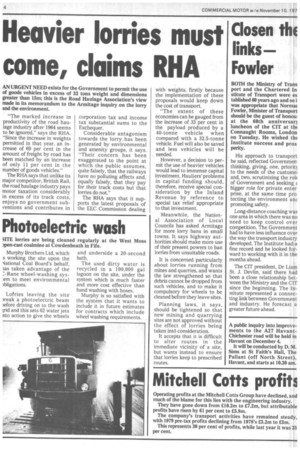Heavier lorries must come, claims RHA
Page 6

If you've noticed an error in this article please click here to report it so we can fix it.
AN URGENT NEED exists for the Government to permit the use of goods vehicles in excess of 32 tons weight and dimensions greater than 15m; this is the Road Haulage Association's view made in its memorandum to the Armitage inquiry on the lorry and the environment.
"The marked increase in productivity of the road haulage industry after 1964 seems to be ignored," says the RHA. "Since the increase in weights permitted in that year, an increase of 69 per cent in the amount of freight by road has been matched by an increase of only 11 per cent in the number of goods vehicles."
The RHA says that unlike its major competitor, British Rail, the road haulage industry pays motor taxation considerably in excess of its track costs, enjoys no government subventions and contributes in corporation tax and income tax substantial sums to the Exchequer.
Considerable antagonism towards the lorry has been generated by environmental and amenity groups, it says. "Their concern has been exaggerated to the point at which the public assumes, quite falsely, that the railways have no polluting affects and, equally falsely, that they pay for their track costs but that lorries do not."
The RHA says that it supports the latest proposals of the EEC Commission dealing with weights, firstly because the implementation of these proposals would keep down the cost of transport.
"The extent of these economies can be gauged from the increase of 33 per cent in the payload produced by a 40-tonne vehicle when compared with a 32.5-tonne vehicle. Fuel will also be saved and less vehicles will be needed.
However, a decision to permit the use of heavier vehicles would lead to immense capital investment. Hauliers' problems in capital funding should, therefore, receive special consideration by the Inland Revenue by reference to special tax relief appropriate to that investment.
Meanwhile, the National Association of Local Councils has asked Armitage for more lorry bans in small towns. It says highway authorities should make more use of their present powers to ban lorries from unsuitable roads.
It is concerned particularly about lorries running from mines and quarries, and wants the law strengthened so that debris cannot be dropped from such vehicles, and to make it compulsory for wheels to be cleaned before they leave sites.
Planning laws, it says, should be tightened so that new mining and quarrying sites are not approved without the effect of lorries being taken inter consideration.
It accepts that it is difficult to alter routes in the immediate vicinity of a site, but wants instead to ensure that lorries keep to prescribed routes.












































































































































































































































